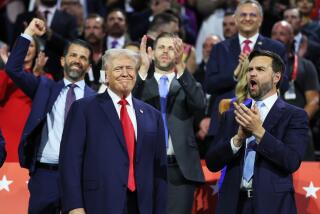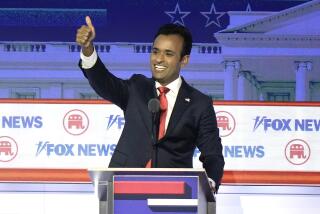Cheney assertions of lives saved hard to support
- Share via
WASHINGTON — In the bitter debate over the nation’s counter-terrorism policies, former Vice President Dick Cheney has introduced an assertion that substantially raises the stakes.
Twice in the last two weeks -- including during his speaking duel with President Obama on Thursday -- Cheney has said that the Bush administration’s approach may have saved “hundreds of thousands” of lives.
It is a claim that goes beyond anything Cheney or former President George W. Bush said while in office -- crediting their approach with preventing casualties on a scale that the United States has not seen since World War II.
But terrorism experts said that though it is possible to envision scenarios that involve casualties of that magnitude, no evidence has emerged about the plots disrupted during the Bush administration to suggest that Cheney’s claim is true.
“It’s an easy thing to say and a difficult thing to prove,” said Bruce Hoffman, a terrorism expert at Georgetown University. “I think it’s another broadside in this ongoing feud.”
Cheney first used the language during a May 10 appearance on CBS’ “Face the Nation.”
“I’m convinced, absolutely convinced, that we saved thousands, perhaps hundreds of thousands of lives,” he said.
Cheney’s assertion is plausible if he is referring to concerns that Al Qaeda had ambitions of acquiring a nuclear, biological or chemical weapon, said Gary J. Schmitt, an intelligence expert at the American Enterprise Institute, where Cheney delivered his speech Thursday.
“Because they disrupted the leadership of Al Qaeda,” Schmitt said, Cheney can reasonably argue that “they were able in some larger sense to preclude a [weapons of mass destruction] attack in the years ahead.”
But in his second reference to six-figure casualties, Cheney went further, saying that those lives were saved as a direct result of the CIA’s use of waterboarding and other so-called “enhanced” interrogation methods.
“The intelligence officers who questioned the terrorists can be proud of their work and proud of the results,” Cheney said in his speech Thursday, “because they prevented the violent death of thousands, if not hundreds of thousands, of people.”
That assertion is more difficult to support, experts said, because there is no evidence that Khalid Shaikh Mohammed or other Al Qaeda suspects formerly in CIA custody yielded intelligence on plots involving nuclear or other mass-casualty weapons.
Last year, then-President Bush listed a series of plots that he said had been thwarted during his administration. Among them were alleged plans to blow up fuel tanks at a New York airport and airliners bound for the East Coast, and to destroy the U.S. Bank skyscraper in Los Angeles.
Al Qaeda’s efforts to produce anthrax at laboratories in Afghanistan were derailed by the U.S. invasion in 2001. The terrorist network’s plots involving illicit weapons have been unsuccessful and small in scale.
After his arrest in Chicago in 2002, Jose Padilla was accused of plotting to detonate a radiological bomb, a device that uses a conventional explosive to spread contaminating debris. He was ultimately convicted of aiding terrorists.
In perhaps the most advanced terrorism plot involving unconventional weapons, Kamel Bourgass was accused in 2003 of making the poison ricin in a London apartment. Authorities found recipes but no actual ricin, however, and Bourgass was convicted of plotting “to cause a public nuisance.”
“No matter how you slice this, it’s very hard to get to the hundred thousand figure unless Al Qaeda had a nuclear weapon,” Hoffman said. “Which they didn’t.”
Cheney’s transition office did not respond to a request for comment.
Obama has also made assertions in the counter-terrorism debate that are difficult to assess. In making the case Thursday for closing the Guantanamo Bay detention facility, he said that the island prison had “likely created more terrorists around the world than it ever detained.”
But “nobody knows that for a fact,” Schmitt said. “That is the reason why this is such a hard debate in some ways -- because until one actually sees the intelligence they’re sitting on, it’s virtually impossible to make a judgment that what either Obama or Cheney is saying is spot on.”
--
More to Read
Sign up for Essential California
The most important California stories and recommendations in your inbox every morning.
You may occasionally receive promotional content from the Los Angeles Times.










